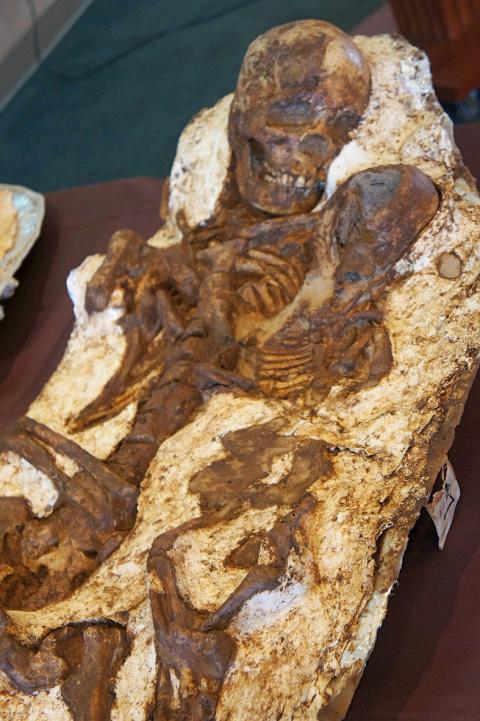Archeological finds in Taichung last year, which seem to show a mother cradling her child, have been described by media outlets as a perfect symbol of a mother’s timeless love ahead of the Mother’s Day celebrations.
Carbon dating suggested the bones excavated from what is now called the Anhe Ruins (安和遺址) last year near the intersection of Anhe Road, Taiwan Boulevard and Chaoma Road in Taichung, along with 47 other sets of fossilized bones, are 4,800 years old.
National Museum of Natural Science department of anthropology director Chu Whei-lee (屈慧麗) said carbon tests showed the findings to be the earliest traces of human activity in central Taiwan.

Photo courtesy of National Museum of Natural Science
The ruins were designated a city heritage site, with the immediate area around the ruins also designated a temporary heritage area.
The area is to be under the protection of the Cultural Heritage Preservation Act (文化資產保存法), with any development requiring governmental oversight or test digging to ensure no fossils or relics are in the area, Taichung Bureau of Cultural Affairs Director Wang Chih-cheng (王志誠) said.
Wang added that if the city discovers an obvious “cultural layer,” an archeological term defined as any layer within an archeological dig formed by relics left by evident human activity, the city government will be sure to preserve the relics and see to their removal for professional care.

Right-wing political scientist Laura Fernandez on Sunday won Costa Rica’s presidential election by a landslide, after promising to crack down on rising violence linked to the cocaine trade. Fernandez’s nearest rival, economist Alvaro Ramos, conceded defeat as results showed the ruling party far exceeding the threshold of 40 percent needed to avoid a runoff. With 94 percent of polling stations counted, the political heir of outgoing Costa Rican President Rodrigo Chaves had captured 48.3 percent of the vote compared with Ramos’ 33.4 percent, the Supreme Electoral Tribunal said. As soon as the first results were announced, members of Fernandez’s Sovereign People’s Party

MORE RESPONSIBILITY: Draftees would be expected to fight alongside professional soldiers, likely requiring the transformation of some training brigades into combat units The armed forces are to start incorporating new conscripts into combined arms brigades this year to enhance combat readiness, the Executive Yuan’s latest policy report said. The new policy would affect Taiwanese men entering the military for their compulsory service, which was extended to one year under reforms by then-president Tsai Ing-wen (蔡英文) in 2022. The conscripts would be trained to operate machine guns, uncrewed aerial vehicles, anti-tank guided missile launchers and Stinger air defense systems, the report said, adding that the basic training would be lengthened to eight weeks. After basic training, conscripts would be sorted into infantry battalions that would take

GROWING AMBITIONS: The scale and tempo of the operations show that the Strait has become the core theater for China to expand its security interests, the report said Chinese military aircraft incursions around Taiwan have surged nearly 15-fold over the past five years, according to a report released yesterday by the Democratic Progressive Party’s (DPP) Department of China Affairs. Sorties in the Taiwan Strait were previously irregular, totaling 380 in 2020, but have since evolved into routine operations, the report showed. “This demonstrates that the Taiwan Strait has become both the starting point and testing ground for Beijing’s expansionist ambitions,” it said. Driven by military expansionism, China is systematically pursuing actions aimed at altering the regional “status quo,” the department said, adding that Taiwan represents the most critical link in China’s

EMERGING FIELDS: The Chinese president said that the two countries would explore cooperation in green technology, the digital economy and artificial intelligence Chinese President Xi Jinping (習近平) yesterday called for an “equal and orderly multipolar world” in the face of “unilateral bullying,” in an apparent jab at the US. Xi was speaking during talks in Beijing with Uruguayan President Yamandu Orsi, the first South American leader to visit China since US special forces captured then-Venezuelan president Nicolas Maduro last month — an operation that Beijing condemned as a violation of sovereignty. Orsi follows a slew of leaders to have visited China seeking to boost ties with the world’s second-largest economy to hedge against US President Donald Trump’s increasingly unpredictable administration. “The international situation is fraught